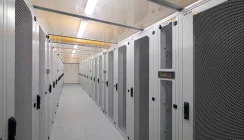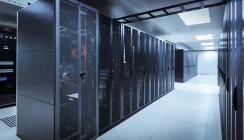Future Proofing Server Rooms For The Internet of Things
At Server Room Environments we see a growing importance for on-site server rooms, even with more businesses turning to Cloud based services. What’s driving the demand for on-site IT facilities is the need to prepare for the Internet of Things, Edge Computing and the level of critical infrastructure that organisations will need soon.
It’s important to remember that a datacentre is a managed building dedicated to the provision of sever-based services whether it is an Enterprise datacentre or a Colo (Co-location) one. We believe that the shift in the datacentre market globally will be towards mega-sized datacentres which will provide many of the cloud-based services we will rely on day-to-day. These can already be provided by Amazon AWS, Google and Microsoft Azure with new players like Huawei posing a real threat to the established players. Competition amongst mega-sized datacentres and their scale provision will lead to ever falling prices for cloud services. At the same time more and more devices will become internet enabled.
Worldwide, by 2030 there could be over 30 billion connected Internet of Things (IoT) including Industry 4.0 or Industrial Internet of Things (IIoT) devices (https://www.statista.com/statistics/471264/iot-number-of-connected-devices-worldwide). Whilst these will connect via the Cloud to mega-sized datacentres, the local environment must be able to provide secure data processing and network communications. More sophisticated network closets, computer rooms and server rooms will continue to evolve to meet this demand as will micro-datacentres serving Edge computing applications. One only has think about self-driving electric vehicles to consider the number and frequency of internet connections that will be required for auto-pilots to function safely.
So, should an organisation prepare its on-site server facilities? Here we provide our checklist which is general in its approach.
Computer and Server Room Design Checklist
- Physical Space: most organisations have seen a shrinkage in the amount of IT hardware on-site thanks to developments including virtualisation and the use of Solid State Drives (SSDs). Most IT equipment is also housed in rack cabinets for ease of physical storage and security. Rack cabinets allow organisations to scale vertically (if there is room in the rack) and thought should be given as to how many rack cabinets they will require in the future. Designed to fit on a standard computer room floor tile makes planning somewhat easier as it allows the room to be sized and prepared to a grid-type format. It’s the same graphic we use in our logo. Cabinet weight is another important consideration and if the server room is going to grow, a raised access floor can provide many benefits including under floor wiring, cooling and an easier route to rack reorganisation within the facility.
- Connectivity and Bandwidth: as we move more towards 5G mobile, fibre and Wi-Fi connections it is important to consider ‘data’ entry into and out of the server room and cabinets. Patch panels and routers will be housed within the racks, but thought must be given to network security, both physical and cyber attacks as well as resilience in the form of redundant comms.
- Power Protection and Electrical Circuits: with an organisation ever more reliant on its IT network, it becomes increasingly important to prepare a power protection plan. Knowing the amount of kit to go into a server rack helps to identify power requirements in terms of kVA and kW but what about the future and what are the implications for electrical circuits within the room? Most server rooms have a sub-distribution panel (more than likely three phase) at the room entrance which supply circuits and systems within the room. These circuit breakers in the panel need to be rated according to the application and suitable for the loads. Knowing the load sizes allows decisions to be taken as to whether to provide a larger uninterruptible power supply to protect the distribution board or whether to install UPS and power distribution units (PDUs) at the rack level. Resilience in the form of N+1 and maintenance should also be considered.
- Cooling: once all the equipment is sized thought can be given to how to cool the environment. Choosing the right computer room air conditioner (CRAC) system and cooling methodology is an important aspect based on room size, layout and loads. N+1 and resilience may be important aspects to consider as well as potentially the use of hot-aisle/cold-aisle containment.
- Total Cost of Ownership and Energy Efficiency: it common for many types of server room hardware to be leased rather than purchased outright. Finance is important and when comparing project bids, it can be as important to factor in maintenance and running costs to provide Total Cost of Ownership (TCO) figures. Energy efficiency also plays a role here as the more energy efficient the servers, UPS and air conditioning technologies the lower the energy consumption and running costs.
- Backup and Disaster Recovery: even when following manufacturer’s recommendations for regular maintenance and consumables replacement failures can occur. We have stressed the need for resilience within critical infrastructure elements of the server room environment but how do you prepare for a site wide failure related to a prolonged power outage or loss of fibre connectivity. Here some of the techniques used by datacentre environments can be incorporated into the server room design including N+1 provision of comms and power sources. Where this is not possible the organisation needs to prepare and test its disaster recovery plan.
Whilst not comprehensive by any means our server room design checklist provides areas for consideration when it comes to future-proofing. If you would prefer a site-specific review and consultation, please ask us for a site survey. We provide surveys free of charge in the UK if we can schedule the visit request date easily into the diaries of our project managers. Alternatively, we are always available for consultative call or webinar type meeting.


























